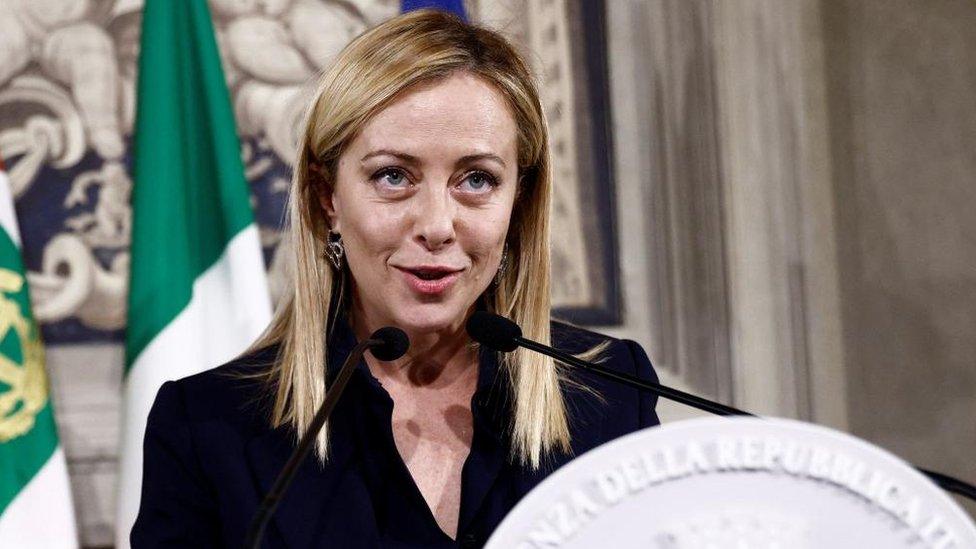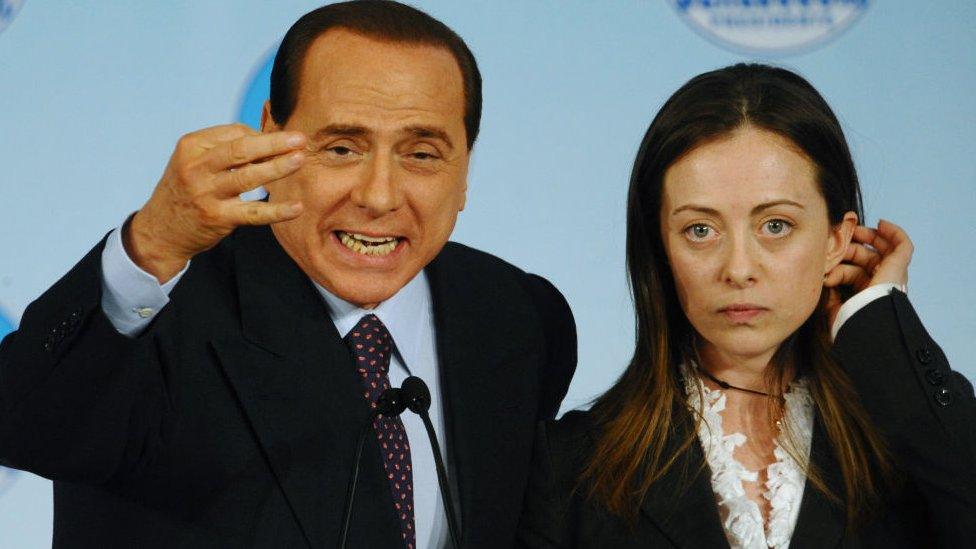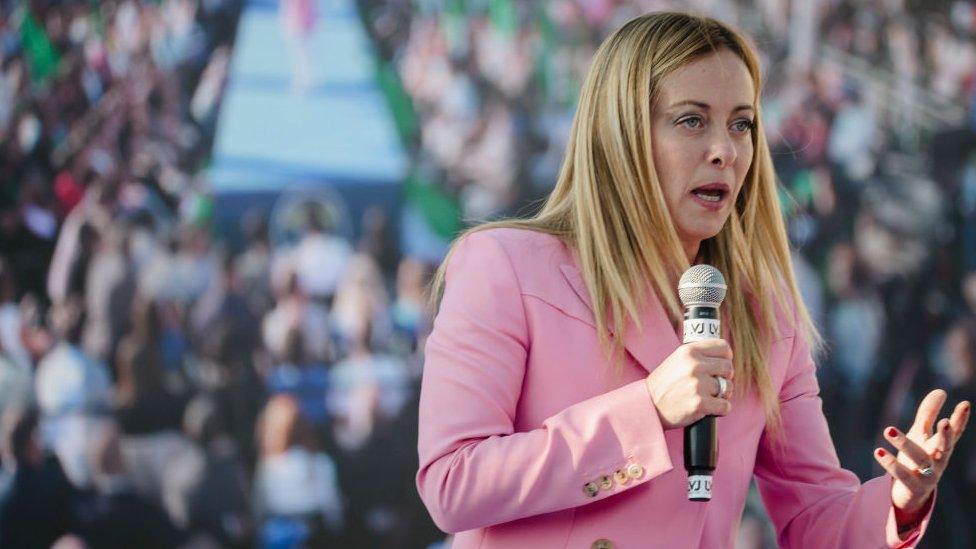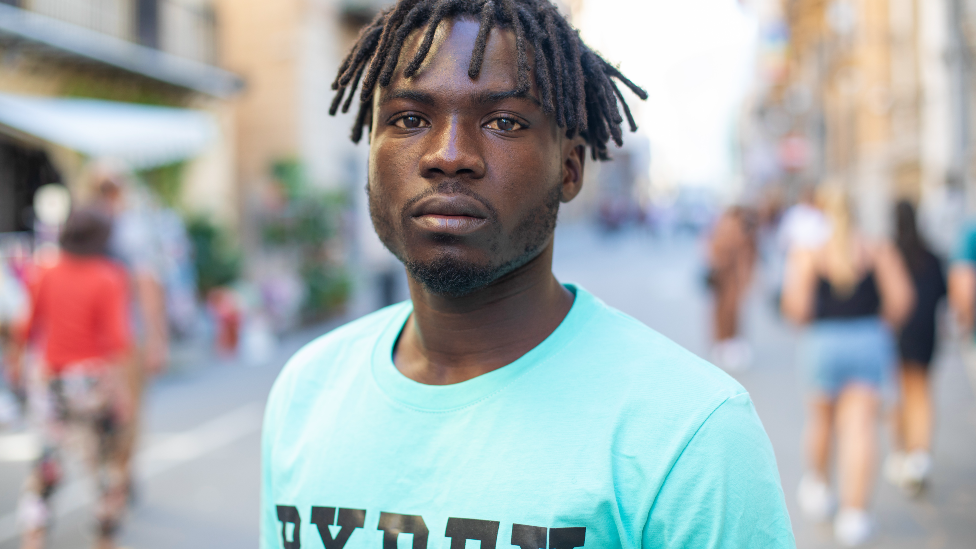Who is Giorgia Meloni? The rise to power of Italy's new far-right PM
- Published

Giorgia Meloni becomes Italy's first female prime minister, leading its most right-wing government since the war
Her rise to power at the head of the party she founded has been meteoric, but Giorgia Meloni has been politically active since she was a teenage activist in a neo-fascist party's youth wing in Rome.
Now at 45 she has accepted the role of Italy's first female prime minister, although she has picked a government in which only one in four ministers are women.
Meloni has come to power partly by fortune. Her Brothers of Italy party was one of very few that chose not to join Mario Draghi's national unity government and she became a solitary opposition voice.
Although she has led her party for 10 years, her experience in government is limited to a spell as Italy's youngest minister in the Berlusconi government from 2008-11. Her party won the September 2022 elections with 26% of the vote, even though it had polled only 4.3% four years earlier.
"Italians have sent a clear message in favour of a right-wing government led by Brothers of Italy," she declared after her election win. With her partners from the far-right League and centre-right of ex-prime minister Silvio Berlusconi, she has a strong majority to steer through her programme.
A clue to her priorities came in a typically raucous speech she gave in Spain last June.
"Yes to the natural family, no to the LGBT lobby, yes to sexual identity, no to gender ideology... no to Islamist violence, yes to secure borders, no to mass migration... no to big international finance... no to the bureaucrats of Brussels!"
In another well-quoted speech from 2019 she said: "I am Giorgia, I'm a woman, I'm a mother... I'm Christian."
For the role of Italy's new family and birth rate minister, she has picked Eugenia Roccella who has spoken out against abortion and threatened to reverse recently agreed rights for same-sex parents.
Nevertheless, the new prime minister has promised to govern "for everyone" and she has sought to assure Italy's allies in both Nato and the European Union that there will be no change in direction in foreign policy. An important point as both Matteo Salvini who heads the League and Silvio Berlusconi have been strong admirers of Russia's Vladimir Putin.
"Giorgia Meloni comes from a post-fascist cultural background but recently she's taken a very moderate position and stated she won't change [predecessor Mario] Draghi's policy on Ukraine," Italian political scientist Prof Roberto D'Alimonte told the BBC. "She did this because she had to build her credentials to be a legitimate candidate for prime minister."
Giorgia Meloni hails from Garbatella in southern Rome, a working class but up-and-coming area. It isn't easy to find many Brothers of Italy voters in this district seen traditionally as left of centre.

In 2008, Meloni became Italy's youngest ever minister in Silvio Berlusconi's government
Raised by her mother, after her parents separated, she gravitated to the youth wing of the Italian Social Movement, born out of the ashes of Benito Mussolini's wartime fascists.
Aged 19, she was filmed as a party activist in 1996. "I think Mussolini was a good politician., external Everything he did, he did for Italy. And we haven't had any politicians like that in the past 50 years," she told French TV. The piece even had a clip of her mother, Anna Paratore, saying she had not sought to push her own far-right views on her daughter.
Giorgia Meloni later headed the student branch of the movement's successor, National Alliance.
At the age of 11 she discovered Tolkien's fantasy classic, Lord of the Rings, and regularly dressed up as a Hobbit. The book was to influence her political career too. When she became youth minister in 2008 she posed for a magazine beside a statue of Gandalf, one of five wizards in Tolkien's book. She even referenced a Tolkien battle speech at the end of her election campaign.
"I think that Tolkien could say better than we can what conservatives believe in," she recently told the New York Times.
Meloni is adamant that the party she formed in 2012 has no links to fascism, but some of its members appear to hold a candle for Mussolini and it retains an old logo of the tricolour flame, often thought to represent the fire on Mussolini's tomb.
The new Senate speaker, Ignazio La Russa, collects fascist memorabilia and his brother was seen making what appeared to be a fascist salute at a funeral.
"The hard core of the party is still far right, yet the new voters who backed Meloni are not," says Prof D'Alimonte. He believes the new prime minister is taking Brothers of Italy into uncharted territory and needs to give it a new profile.
That may require a more moderate approach than she and her allies would naturally adopt.
Meloni may have picked an anti-abortion minister but she has promised to fully enforce the law that protects access to abortion. Same-sex couples have fewer rights in Italy than many other European countries, and Meloni has no plans to overturn existing laws. But she has spoken out against adoptions and surrogacy involving LGBT couples.

During the election campaign, Meloni sought to convey a softer image
For now her coalition appears united. One look at the make-up of Italy's two houses of parliament shows the strong majority she has been able to muster with her own party backed by Forza Italia and the League. The centre and left parties failed to find enough common ground to challenge her bid for power.
But that unity may not last. Forza Italia in particular could become an awkward ally, with veteran ex-prime minister Silvio Berlusconi consigned to little more than a walk-on part.
Italian media seized on a scrap of paper in parliament on which he appeared to label Meloni as "patronising, bossy, arrogant, offensive", and with the word ridiculous scribbled out. He also wrote that there was "no willingness to change - she's one you can't get along with".
Berlusconi had wanted the plum Senate job for his top aide Licia Ronzulli but the Brothers of Italy leader had refused. The two women are described as bitter enemies, which does not bode well for the future.
Related topics
- Published22 October 2022

- Published21 October 2022
